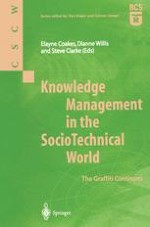2002 | Buch
Knowledge Management in the SocioTechnical World
The Graffiti Continues
herausgegeben von: Elayne Coakes, BA, MSc, MIDP, AMBCS, Dianne Willis, BA, MA, AMBCS, Steve Clarke, BSc, MBA, PhD
Verlag: Springer London
Buchreihe : Computer Supported Cooperative Work
Enthalten in: Professional Book Archive
